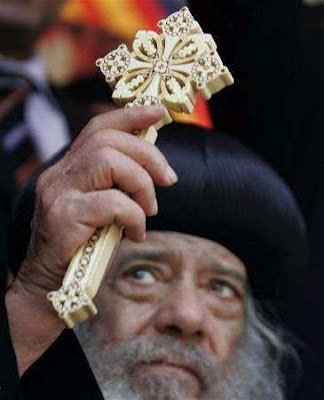Tuesday, March 20, 2012
Athanasius on wrestling
Every once in a while I crack open my copy of Athanasius' On the Incarnation and re-read a few sections. Sometimes I just flip open to a random page and see what I find. It's always good. But what I like best is the fact that this little book was written about 1700 years ago and that it still has the ability, like Scripture, to clarify things that should seem so obvious by now. I dare say I find more inspiration and solace in these "golden oldies" than just about anything published nowadays.
So, in memory of Shenouda III, the Pope of the Coptic Orthodox Church who died this week after serving as Patriarch for 41 years, I post this portion of Part XXIV where Athanasius discusses the signifance of the particular the manner of Jesus' death. Athanasius, too, was a Copt, and from what I can tell, had some similar personality traits and career paths with Shenouda, despite living at such different times in world history. Both endured exile at one point or another, for example. Both prevailed in expanding the reach of their communion. May the witness of all the saints--ancient, recent, and contemporary--bless us and lead the Church, the body of Christ, toward greater unity.
3. And just as a noble wrestler, great in skill and courage, does not pick out his antagonists for himself, lest he should raise a suspicion of his being afraid of some of them, but puts it in the choice of the onlookers, and especially so if they happen to be his enemies, so that against whomsoever they match him, him he may throw, and be believed to be superior to them all; so also the Life of all, our Lord and Savior, even Christ, did not devise a death for His own body, so as not to appear to be fearing some other death; but he accepted on the Cross, and endured, a death inflicted by others, and above all by His enemies, which they thought dreadful and ignominious and not to be faced; so that this also being destroyed, bot He Himself might be believed to be the Life, and the power of death be brought utterly to nought.
4. So something surprising has happened; for the death, which they thought to inflict as a disgrace, was actually a monument of victory against death itself. Whence neither did He suffer the death of John, his head being severed, nor, as Esaias, was He sawn in sunder; in order that even in death He might still keep His body undivided and in perfect soundness, and no pretext be afforded to those that would divide the Church.
Subscribe to:
Post Comments (Atom)


No comments:
Post a Comment